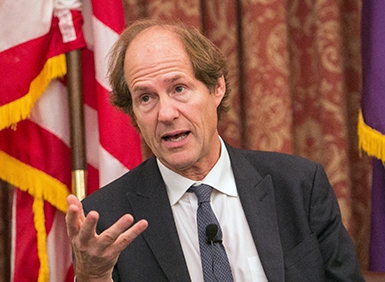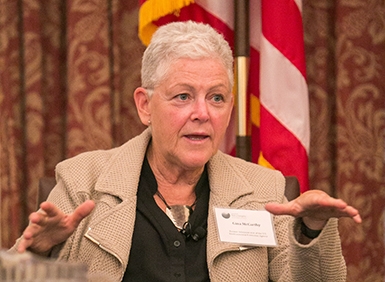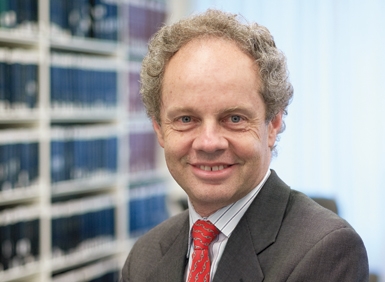The Institute for Policy Integrity brings economic sense to regulatory debates
The tumultuous state of US environmental regulation during the Trump administration was implicit in the title of the 10th anniversary conference of NYU Law’s Institute for Policy Integrity: “Energy and Environmental Policy: The Quest for Rationality.” But when environmental policy experts convened at the Law School in late September, the two keynote speakers, both seasoned veterans of regulatory battles, articulated reasons for cautious optimism.
“We often think that the issues that divide us are issues of values,” said Cass Sunstein, former administrator of the White House Office of Information and Regulatory Affairs during the Obama administration, in his keynote address. “But the fundamental divisions involve issues of fact, not values…. What I want to suggest is that immersion in the facts is often a way of quieting, and—more frequently than at least I would expect—a way of eliminating disagreement.” He cited instances in which the Trump administration had acquiesced to Obama-era regulations that were backed up by relevant facts.
In a keynote dialogue with Dean Emeritus Richard Revesz, Policy Integrity’s director, another speaker, Gina McCarthy, the former administrator of the US Environmental Protection Agency (EPA), took aim at the Trump administration’s efforts to dismantle the Clean Power Plan and other regulations. “They are proposing not to protect public health and the environment, in a way that's more expensive,” she said. But McCarthy added that she derived solace from the fact that current officials would find it more difficult to undo regulations grounded in solid cost-benefit analysis, and suggested that the real power lay with citizens: “What we really need to do is to make sure that we’re giving people the information they need to demand, in a democracy, what they can get.”
That focus on public policy informed by hard facts, including cost-benefit analysis, remains at the core of the Institute for Policy Integrity’s mission a decade after its founding in 2008, the same year that Revesz published Retaking Rationality: How Cost-Benefit Analysis Can Better Protect the Environment and Our Health with co-author Michael Livermore ’06, who became Policy Integrity’s first executive director. The book makes the case that those on the side of stronger environmental, public health, and safety protections had, by rejecting the use of economic analysis to bolster their arguments, allowed industry and conservative forces to dominate the public discourse; Retaking Rationality argues that the anti-regulatory camp has overestimated costs and underestimated benefits.
“We identified a pathology in regulatory policy, which was the fact that groups on one side of the debate had absented themselves from important discussions,” says Revesz. “That had created an imbalance, and we worked very hard to begin to correct that imbalance, [and] I think, to a large extent, we’ve made a significant difference.”
In policy briefs, reports, academic articles, and working papers, the prolific Policy Integrity academics write about climate change and energy policy, electricity, jobs and regulation, safety and consumer protection, natural resources, and other key issues. Their work is often cited—and they are quoted and published—by major media outlets.
But Policy Integrity’s activities extend far beyond the keyboard. Its input into regulatory proceedings has helped shape New York State energy policy; played a role in the decisions of several states to utilize the social cost of carbon (the dollar value of the damage a ton of carbon dioxide emissions inflicts in a given year) in energy decision-making; and helped persuade the Interior Department to place a moratorium on new coal leases. While initially focused primarily on the federal government, Policy Integrity now does much of its work at the state level, such as in state electricity proceedings to structure electricity markets and determine how to account for various environmental benefits. State agencies, Revesz explains, tend to have less expertise than federal ones: “We found this unmet need and became involved.”
Policy Integrity amicus briefs have figured significantly in several important US Supreme Court cases, such as Michigan v. EPA, a battle over the EPA’s Mercury and Air Toxics Standards for power plant emissions. An argument from the Policy Integrity brief occupied half of the oral argument time. In a 2016 case, the US Court of Appeals for the Seventh Circuit upheld the Department of Energy’s use of the social cost of carbon in its energy efficiency standards; only the Policy Integrity brief had addressed the social cost of carbon extensively, as the court itself acknowledged. The Seventh Circuit became the first court to rule on the legality of a federal agency’s using the social cost of carbon to regulate, thus setting a crucial precedent for which Policy Integrity had long advocated.
The students who take the Regulatory Policy Clinic, taught by Revesz and Adjunct Professor Jack Lienke ’11, play a major rule in preparing amicus briefs as well as comments in the federal rulemaking process. Non-clinic students also work as research assistants. “Students who work with us are really our colleagues,” says Revesz. Policy Integrity alumni have gone on to work at the Environmental Defense Fund, the Federal Trade Commission, the Natural Resources Defense Council, the White House Office of Management and Budget, the Justice Department, the Labor Department, and, of course, the EPA. “The fact that these people were trained with us and went off to be really successful in this space will end up being a very significant contribution,” Revesz adds.
As for what Policy Integrity’s portfolio will look like 10 years down the road, the volatility of environmental regulatory debates does not encourage forecasting. But whatever happens, Revesz sees Policy Integrity moving steadily forward. “I can’t tell what the next thing will be,” he says, “but I’m pretty confident there will be a next thing.”
Posted November 30, 2018
Watch video of the Institute for Policy Integrity's 10th anniversary conference here:




